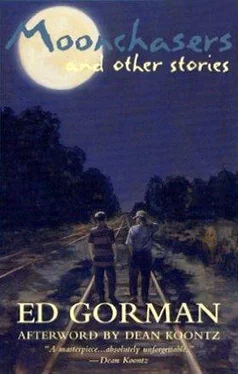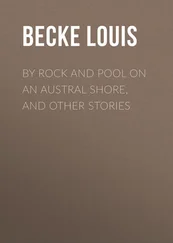I sat beside Debbie on the couch. We both had metal TV trays which were kind of wobbly. She said, “It’s hard to eat this corn with that tooth gone, Mom.”
Which was when I figured out why she’d looked so strange when I’d come in. One of her front teeth was missing. In case I forgot to mention it, she’s eight.
“Just do your best, honey,” which is what Mom usually said to stuff like that.
“Let’s see,” I said.
Debbie put her little face with the big thick glasses she had to wear up for me to see. There was a hole in the top row.
“You still have the tooth?”
“Upstairs.”
“Be sure and put it under your pillow.”
“How much do you think he’ll leave this time?”
“Maybe fifty cents.”
“Boy!”
Last time she lost a tooth, Dad put a quarter under her pillow while she was asleep, then I went in my room and took a quarter from my Roy Rogers savings bank (I never got around to throwing things away, I guess) and then slipped it under her pillow, too.
We went back to eating. After Douglas Edwards, the local news came on which of course set Dad off griping about how every single person in the news business was a Democrat if not a Communist. Dad had never forgiven the press for what they did — or what he said they did, anyway — to his idol Robert Taft. You know, when Ike “stole” the Republican nomination from him.
The phone rang. Mom, who was on her way to the kitchen, got it and said, “For you, Tom.”
“Guess who’s been cruising past my house?” Barney said. “Who?”
“Who do you think? Cushing.”
“Cushing? You sure?”
“Positive.”
“When you leave, go out the back door. And then go down the alley. I’ll meet you at our old clubhouse.”
“Maybe he’ll start cruising past your house, too.”
“I’ll see you in twenty minutes.”
When I went back into the living room, a commercial was on so Dad was talking to everybody. “I took that money over to the chief and told him how you found it out by the crick and all. He wants you to stop in in the next couple days and talk to him.”
“Is he mad?”
“Not mad but kinda disappointed, I think. That you didn’t turn it in as soon as you found it. He said something I didn’t even think about.”
“Like what?”
“Like about that bank robber. The FBI thinks he’s up in the northern part of the state but now the chief thinks maybe he’s around here somewhere, the way you found that money and all. Anyway, if you’d brought the money in right away, the chief could’ve put some men on looking for the robber. Now the guy’s probably long gone.”
I made a quick pit stop upstairs and in five minutes was ready to go.
In the kitchen, I worked fast. I grabbed a paper sack from a drawer and dropped an apple in it, and then followed the apple with two slices of wheat bread, three slices of summer sausage, two bottles of Pepsi, a slice of Mom’s chocolate cake with white frosting that I wrapped in wax paper, and some carrot sticks that Mom always kept in this plastic bowl. I didn’t have to worry about them hearing me because the window air-conditioner sounded like a B-52 but I didn’t want Mom to wander out in the kitchen and see me loading up and then start asking all these questions.
I went out the back way, down the three back porch steps, under the clotheslines, past the dog house, along the row of garbage cans next to the small white garage whose shingles smelled as if they’d melted some in the heat, and out into the narrow gravel chalk-dust alley where I used to be Roy Rogers, Gene Autry, Allan “Rocky” Lane and Lash LaRue, sometimes all on the same day.
It took me twenty minutes to get to the clubhouse, which was this long-abandoned garage on the downwind side of the city dump which, as you might think, did not smell exactly wonderful during a windless sundown of eighty-six degrees. I’d smoked my first cigarette in this garage, and then got so sick that I couldn’t get out of bed for a day, and got my first glimpse of a Playboy foldout which Barney’s sixteen-year-old cousin Stan had copped from his dad’s bureau drawer.
The clubhouse resembled this old sagging weatherworn outhouse in this small field of burned grass and empty tin cans and jagged broken pop bottles.
Barney was inside, squatted over in a shadowy corner with a bottle of Pepsi and a Lucky Strike. The last of the dusty sunlight peeped through the spaces between the boards. I’d brought along my old Boy Scout flashlight, which is the color a baby shits when he’s got the trots, and I shined it all over the dirt floor. About the only thing to see were a couple of squirming night crawlers who looked like my light had just woken them up.
“You see Cushing?” Barney said.
“Huh-uh.”
“I didn’t, either.”
I asked him for a cigarette and when I got it going, I told him what the chief had said, about the found money maybe belonging to the bank robber.
“No wonder Cushing’s following us,” Barney said.
“He probably thinks we can lead him to the robbery money.”
“And to the robber. Wouldn’t he get some kind of award?”
“Reward, Barney. You always say that. It’s reward.”
“Up yours.”
“Spoken like a truly mature person.”
Barney said, “How we gonna get to Roy without Cushing finding out?”
“We’ll just have to be careful.”
He poked the sack. “You swipe him some pretty good stuff?”
“He’s probably so hungry he’d eat shoe leather.”
“You wanna go?”
“Let’s look for Cushing first.”
One nice thing about the clubhouse, you’ve got spy holes all over the place. I wish my house had a few spy holes, too. You never know when they’ll come in handy.
Barney took one wall and I took the other. We both looked for any sign of Cushing’s car. But there was just blanched prairie and the burning malodorous city dump and small frame houses on this particular edge of town.
So we went. We cut wide around the dump, Barney saying what he always said (“I’ll bet there’s a lot of valuable stuff in there if you just had the time to look through it all”) and then saw the railroad tracks gleaming in the last few minutes of fiery sunlight.
All that separated us from the tracks was a wide area of dusty gravel. We were just walking over to it when Barney said, “Oh, God! Look!”
And there, maybe three hundred yards behind us, came Cushing’s unmarked police car.
“What’ll we do?” Barney said.
“Just calm down.”
“Huh?”
“Just calm down, Barney, or he’ll know something’s wrong for sure. Just keep walking. But instead of turning up toward the tracks, we’ll turn the other way to the crick.”
Cushing’s tires made a lot of slow crunching noise on the gravel.
He got alongside us, doing maybe five, six miles an hour, and said, “How’re my little girl friends doing tonight?” He had on dark shades and he grinned like a killer.
We didn’t say anything. We just kept walking toward the hill that would eventually slope down to the crick. There was a pussy willow tree there that gave a lot of shade during the day.
“You girls stop right there. I want to talk to you.”
I heard him jerk on his emergency brake and then get out of the car. You could smell the gas and oil and heat of the motor.
He walked over in front of us. We’d stopped walking, just like he’d told us to.
“The sack. What’s in it?”
“Nothing special,” I said. Then, “We’re going hiking tonight so we brought some food for a snack.” I was getting so good at this lying business that I was starting to scare myself.
He took the sack, opened it and then shoved his hand way down inside it. I thought of the time Johnny Worchester did that with this old sack he’d found near the crick one day and this giant milk snake was coiled up inside. Legend has it that Johnny filled his pants right on the spot.
Читать дальше












